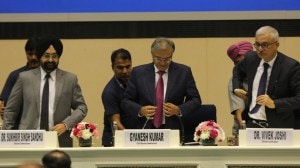From the Urdu Press: ‘Current dispensation wants to bulldoze judiciary too’, ‘SC ruling shows Urdu a bridge, not a wall’
“Rather than looking to extract political mileage, petitioners in the SC against Waqf Amendment Act need to dedicate themselves to the cause in the interest of the Muslim community”: Siasat
 The Urdu dailies spotlighted the Court's move to red-flag certain contentious aspects of the Waqf Act – which led to the Centre pressing pause on them – and recorded the backlash from the BJP camp.
The Urdu dailies spotlighted the Court's move to red-flag certain contentious aspects of the Waqf Act – which led to the Centre pressing pause on them – and recorded the backlash from the BJP camp. Over the week the Urdu dailies kept their focus on rulings by the Supreme Court in cases ranging from pleas challenging the Waqf (Amendment) Act to the row over the use of Urdu on a Maharashtra civic body’s signboard. The dailies spotlighted the Court’s move to red-flag certain contentious aspects of the Waqf Act – which led to the Centre pressing pause on them – and recorded the backlash from the BJP camp. They hailed the apex court’s decision to uphold the Patur municipality’s signage marked with Urdu among other languages, underlining its observation that language is culture meant for connecting people and that Urdu is “the finest specimen of the Ganga-Jamuni Tehzeeb”.
SIASAT
In its April 21 editorial, the Hyderabad-based Siasat flags criticism by BJP MPs Nishikant Dubey and Dinesh Sharma of Chief Justice of India (CJI) Sanjiv Khanna and the Supreme Court, respectively, over observations on the Waqf Act and its order setting timelines for governors and the President in deciding Bills passed by state legislatures. The attempts to target the apex court from different quarters were a cynical bid to create anarchy in the country, says Siasat, adding: “BJP MPs are also firing salvos at the top court to undermine its majesty. All these attempts seem to be part of a calculated design to put pressure on the court and hurt its dignity.”
The editorial notes that on the eve of the hearing on the amended Waqf law in the apex court, Union Minority Affairs Minister Kiran Rijiju had said that he hoped the court would refrain from making intervention in a legislative matter. “The Vice-President then went on an onslaught against the judiciary. And now, the BJP MPs have targeted the apex court and the CJI. These bids are aimed at denting the authority of judiciary, which remains a vital and strong pillar of Indian democracy,” it says.
Referring to BJP president J P Nadda’s statement distancing the party from Dubey and Sharma’s remarks, the daily says the ruling party should have reprimanded them and issued show-cause notices to them. “This betrays the BJP’s hypocrisy. A perception has gained ground that as the top court is seized with various crucial cases and has asked some sharp questions of the government over the amended Waqf law, attempts are being made to pile pressure on it, to the detriment of the country,” the edit says. “At a time when various constitutional institutions have been subverted, courts have remained the people’s last refuge for seeking justice and protection of their rights. It is unfortunate and disturbing that the current dispensation is bent on bulldozing the judiciary too.”
URDU TIMES
Highlighting the Supreme Court’s decision to uphold the use of Urdu on the signboard of the Patur Municipal Council building in Maharashtra’s Akola district, the Mumbai-based Urdu Times, in its April 17 leader, says that India’s greatness lies in its diverse cultures, multiple languages and plural heritage. “The core idea of our country is unity in diversity. This principle has been reinforced by the Court’s ruling dismissing a plea challenging the use of Urdu on the sign board of the Patur municipality,” it says. “The apex court affirmed Urdu’s Indian identity, greatness and deep cultural roots. This was not only a matter pertaining to a signage but a larger issue concerning our composite culture and ethos.”
The daily says: “The Court underlined that language is not religion and does not represent religion. Language belongs to a community and a region, and is the collective legacy of their people.” The apex court called Urdu “the finest specimen of the Ganga Jamuni Tehzeeb”, it notes. “Urdu grew and flourished in India in the course of centuries of amalgamation of diverse languages, cultures and traditions. It has been the language of a galaxy of great poets including Meer, Ghalib, Firaq and Faiz, among others. Without Urdu, the history of India’s literary and cultural history would not be complete.”
The editorial points out that the top court also dispelled the misconception that Hindi is the language of Hindus and Urdu of Muslims, rejecting such prejudiced attempts to drive a wedge between the two Indian languages. The reality is that Hindi and Urdu are two streams of the same civilisation, it says. “The top court’s ruling is remarkable not only legally, but also on the cultural and intellectual grounds. It has pointed out the significant influence of Urdu on the court parlance and our daily life. Urdu is a bridge, not a wall. The court has noted that language is essentially a means of communication and not a political or administrative tool to wield power. So if a section of locals in an area use Urdu, its public institutions should use it to communicate with them,” the edit says. “The apex court’s decision has not only done justice with Urdu but has also upheld the dignity of all languages and cultures. It should be seen as a vindication of our pluralistic ethos, which brings the people together as the Indian nation transcending the divides of religion, caste, creed and race.”
SIASAT
Commenting on the Supreme Court’s move to defer the hearing on the pleas challenging the Waqf Amendment Act to May 5 after recording the Centre’s assurance that it would neither denotify the waqf properties, including waqf-by-user, nor make any appointments to the Waqf Boards and the Council, Siasat, in its April 18 editorial, says the development in the apex court has come as a “relief to not only the Muslim community but all right-thinking people”. Pointing out that a slew of Muslim bodies and Opposition parties and leaders have moved the Court against the Act, the edit notes that the court has granted a week to the Centre to file its response. The Centre’s pause bid came a day after the Court Bench headed by CJI Khanna asked some tough questions of it, the edit states, adding that the Bench asked if the government would allow Muslims in Hindu endowment boards like the way the Act provides for the inclusion of non-Muslims in the Waqf Boards.
“Although the relief given is temporary, it is welcome,” the edit says. “This is to be seen what will be the Centre’s response. The BJP-led government rammed through the Waqf legislation in Parliament by dint of its majority. Earlier, the ruling side had also done the same through the Joint Committee of Parliament. But the matter before the Court could be a different ball game as the government will have to answer bristling questions with sound legal reasoning.”
The daily says the task is also cut out for the petitioners. “They will have to remain alert and prepared for a long haul. They must have a comprehensive legal strategy,” it says. “They must build up a solid, watertight case. Rather than looking to extract political mileage, they will need to dedicate themselves to the Waqf cause in the interest of the Muslim community.”



- 01
- 02
- 03
- 04
- 05




























